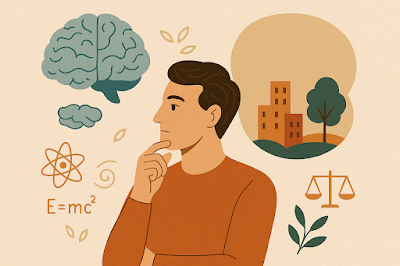Why We Need Both Brain Smart and Street Smart Wisdom to Design the Future??
We often hear people debate whether it’s better to be brain smart—skilled in technical knowledge, strategic thinking, and formal education—or street smart—guided by instinct, life experience, and practical wisdom. But what if that’s the wrong question?
What if the future demands both?
This reflection began in a conversation that challenged me to look beyond these two forms of intelligence as opposing forces. Instead, I started to see them as complementary—necessary parts of a more integrated way of thinking, leading, and building.
The Intelligence We Center Shapes the World We Create
The kind of intelligence we prioritize—whether in hiring processes, leadership models, or system design—doesn’t just affect outcomes. It shapes culture. It influences who feels seen, whose knowledge is valued, and how decisions are made.
And so a deeper question arises:
What kind of intelligence do we need to build systems that are not only efficient, but also ethical, sustainable, and human?
A Convergence of Ethics, Design, and Relationship
Across fields like moral philosophy, regenerative design, and decolonial theory, there’s a growing concern with how we structure relationships—with people, with power, and with the planet.
The ethics of care reminds us that responsibility and empathy matter.
The ethics of interdependence teaches us that no one thrives alone.
Regenerative design calls us to restore, not just sustain.
Relational accountability invites us to be conscious of the impact we have on each other.
These frameworks don’t compete—they converge. And to describe that convergence, I used the term regenerative relational ethic—a phrase that emerged in the moment to name the kind of orientation needed today: one that doesn’t just function, but restores, dignifies, and helps life thrive.
What It Looks Like in Practice
From a philosophical lens, it’s about interdependence.
From a social one, it’s about mutual respect, dignity, and deep listening.
From a technical one, it’s about building tools and systems that support—not replace—human processes.
This approach isn’t about utopian ideals. It’s about asking better questions, especially when we face pressure to scale quickly, perform flawlessly, or innovate endlessly.
So let’s pause and consider:
- What are the early signs that something is falling out of balance?
- How do we tell the difference between a living system and a hollow one?
- What kinds of knowledge are we unconsciously discarding?
What the Future Will Ask of Us
The future won’t be built on expertise or instinct alone.
It will require integration—the maturity to hold complexity and connect across ways of knowing.
Not just what works, but what heals, includes, and endures.
A Question for You
Have you ever felt caught between logic and intuition?
Between formal knowledge and lived experience?
If so, you’re not alone.
I’d love to hear how you’re navigating that intersection—how you’re integrating different forms of intelligence in your work, your leadership, or your community.
Because perhaps the most powerful intelligence we can cultivate now is the kind that knows how to hold difference without collapse—and build from there.



Comentarios
Publicar un comentario